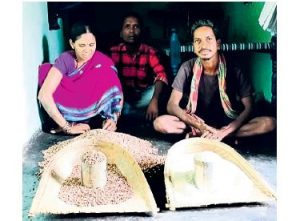Kalahandi’s tribal women keep barter alive

Bhawanipatna: Some villages in the tribal dominated Thuamul Rampur block of Kandhamal district have a timeless quality, seeming almost frozen in a bygone era.
Here, people still discourage the use of cash. Instead, they prefer to barter their agricultural produce to procure essentials — a practice gaining attention in the region, of late.
Residents in these remote villages, surrounded by thick jungles, belong to various tribal communities. They grow different types of pulses, including kandula (pigeon pea), harada (split pigeon pea), moong (green gram), urad (black lentil), kolatha (horse gram) and mandia (finger millet).
Women play a key role in both cultivating and selling these crops to support their families.
But an unusual practice emerges at the point of sale. Customers looking to buy kandula or harada dal must bring rice instead of money. One measure of dal is bartered for three measures of rice. To purchase a full sack of dal, buyers must provide three sacks of rice. Anyone offering cash is turned away empty-handed.
The reason?
Womenfolk in these tribal villages believe keeping cash at home is unsafe. They explain that men don’t know how to handle money properly; they either misuse cash, or spend it irresponsibly. To prevent this, women avoid storing cash, and instead, use barter — exchanging rice or other essentials for goods.
Significantly, the tradition, passed down for generations, has not only helped prevent wasteful spending but has also encouraged men to avoid unnecessary expenses. According to local residents, the system also promotes financial discipline within households.
Agni Majhi and Herabati Majhi, residents of one of the villages, say the practice is more than a tradition. “It’s a conscious effort to lead men toward a more responsible lifestyle,” they reason.
Interestingly, the practice goes beyond dal sales. Even when shopping in the market, many tribal women continue to trade goods using rice instead of money.
PNN
News